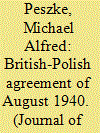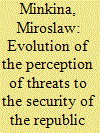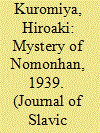| Srl | Item |
| 1 |
ID:
109102


|
|
|
|
|
| Publication |
2011.
|
| Summary/Abstract |
The article discusses the August, 1940 financial and legal arrangement negotiated by the Polish and British Governments regarding the Polish Armed Forces based in the United Kingdom and its possessions. The agreement stipulated that the British Government credits for the Polish military, as well as for the support of the Polish diplomatic and civilian personnel, would be based on the escrow of the Polish Gold evacuated from Poland and to be repaid after the war. The legal and financial agreements that were signed in August 1940, and modified throughout the war, document that the Polish Armed Forces were a sovereign military under the constitutional control of the Polish Government in exile. This historical fact has been eroded by time and the consequences to the Polish cause of the outcome of the war. This article attempts to address the mythologies that have spawned, about the Polish Forces, often well meaning but erroneous nonetheless. The article concludes with a summary of the final auditing of expenses in 1946 when the Polish Gold was returned to a communist dominated Poland.
|
|
|
|
|
|
|
|
|
|
|
|
|
|
|
|
| 2 |
ID:
109101


|
|
|
|
|
| Publication |
2011.
|
| Summary/Abstract |
The present study discusses the evolution of threat perception in the area of national security by the analysis of successive strategic documents of the Republic of Poland. After a brief discussion of terms related to security, it goes on to present how the perception of threat changed over the years 1989-2007. It emphasizes that the source of this evolution was Poland's changing internal and external environment. As the article points out, the originally major threat of immediate armed invasion of Poland virtually no longer exists, due to Poland's membership in the North Atlantic Treaty Organization (NATO) and the European Union (EU). Instead, new threats have emerged with the transnational ones being the most serious.
|
|
|
|
|
|
|
|
|
|
|
|
|
|
|
|
| 3 |
ID:
109103


|
|
|
|
|
| Publication |
2011.
|
| Summary/Abstract |
The Battle of Nomonhan ended decisively in favor of the Soviet Red Army. Yet why it turned out so has not always been clearly understood. In fact, there are other mysteries about Nomonhan: why small skirmishes turned into a major battle, why the command of the Japanese troops (especially its core force, the 23rd Division) was so poor, why the Division Commander Michitaro Komatsubara behaved so peculiarly throughout the battle and after. The present essay suggests that Komatsubara's treachery provides an explanation to these mysteries; he appears to have been a Soviet agent.
|
|
|
|
|
|
|
|
|
|
|
|
|
|
|
|
| 4 |
ID:
109099


|
|
|
|
|
| Publication |
2011.
|
| Summary/Abstract |
This article discusses the ongoing security situation in the Russian North Caucasus, with a particular focus on the upcoming Winter 2014 Olympics in the resort of Sochi. The aim is to discuss groups that could be a source of potential problems, including non-violent groups like the Circassians, which have an issue with the Olympics taking place in their ancestral homeland, and violent rebel organizations like the one led by Doku Umarov. Finally, we will discuss what initiatives Moscow is expected to carry out over the next three years, as well as providing some policy suggestions.
|
|
|
|
|
|
|
|
|
|
|
|
|
|
|
|
| 5 |
ID:
109098


|
|
|
|
|
| Publication |
2011.
|
| Summary/Abstract |
Since Mikhail Gorbachev's signing of the CFE Treaty in 1990, Moscow has viewed the agreement as a 'cornerstone of European security.' Vladimir Putin's announcement in 2007 that Russia would 'suspend' implementation of the treaty appeared to signal a paradigm shift in Moscow's approach to conventional arms control. As the European security landscape changed in ways not always favorable to Russia, the Russians' view of the CFE Treaty evolved from cautious optimism through growing frustration to outright hostility. An examination of Russian official thinking at key points in the life of the treaty-as expressed in official journals and statements by government officials-points to a crisis that nevertheless remains short of a paradigm shift.
|
|
|
|
|
|
|
|
|
|
|
|
|
|
|
|
| 6 |
ID:
109100


|
|
|
|
|
| Publication |
2011.
|
| Summary/Abstract |
The Great Terror was a defining moment of the Stalin era, indeed perhaps the defining moment of 20th century Russian history. The purge of the military is a striking subplot with the potential to unlock the mystery which still surrounds the Terror. Why did Stalin feel the need to decimate his general staff and officer corps on the eve of a world war at the same time as military spending was rising at a breakneck pace? Why destroy with one hand while building with the other? There is no adequate solution to this problem in the existing literature, and recent work does fully not take into account the great wealth of archival materials released in the last 20 years. This historiographical review will seek to evaluate the historiography of the military purge in showing how the literature has evolved, highlighting the diversity of approaches, where there is consensus, where unanswered questions remain, and how it is now possible to advance a more comprehensive explanation of the purge of the military.
|
|
|
|
|
|
|
|
|
|
|
|
|
|
|
|